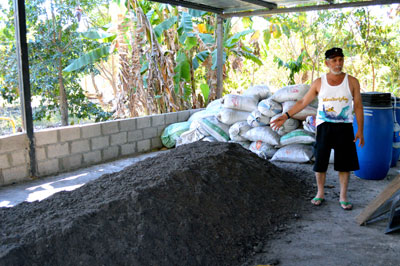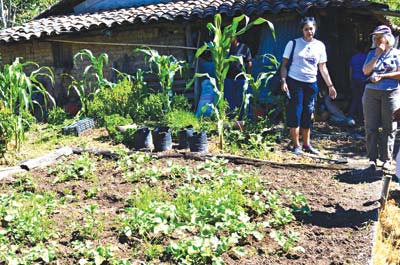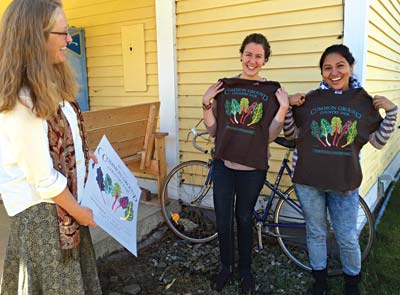 |
| Farmland in the mountains of El Salvador. English photo |
In 2016 the MOFGA-El Salvador Sistering Committee celebrated 15 years of sistering with MOFGA-like organizations in El Salvador. Our committee came about when Salvadoran farmers linked with the Bangor-Carasque Sister City Project talked about issues they face, and some members of the Bangor committee (as well as Russell Libby) noted that farmers in both countries face some similar issues.
Our committee works to create solidarity among small farmers and community organizations in Maine and El Salvador. We promote economic and social justice and environmental protection through sustainable, organic agriculture and sustainable communities. Through this mutual relationship we hope to put a human face on the impact of globalization, learn from each other and educate people in both countries.
Here are a some thoughts from a few of our committee members, as we looked back on our 15 years of sistering.
Karen Volckhausen
As I reflect on 15 years of sistering, I think about the amazing women I have met through our sistering relationship. Women, who suffered unimaginable abuse, terror and loss during 12 years of civil war, nevertheless have emerged with courage and strength to be part of rebuilding their communities and a sustainable future. The social movement has had a concerted effort to focus on women’s rights, leadership training, women-run entrepreneurial community projects and more. I have met women who are in charge of important community projects, farmers supporting their families, elected members of their community councils, presidents of their communities, representatives in their legislative assemblies and the many women leaders in campaigns such as the one to prevent metallic mining in El Salvador.
 |
| Part of a kitchen garden in a Salvadoran dooryard. English photo |
A popular project that has emerged throughout Chalatenango is the formation of savings and loan groups completely run by women. Through a grant from Oxfam to launch the project, these groups are able to loan money to women for such community enterprises as a chicken-raising or soap-making business or a community store. The money is paid back with a small amount of interest. These projects have been highly successful. One small community had five such groups, one run by young women.
Another successful project encourages women to start home gardens to raise healthy vegetables to supplement their traditional diet of corn and beans. The women realized the need for education about how to cook the food, so they developed a cookbook that is widely used in the area.
Hats off to the women of Chalatenango; they are an inspiration to us all!
Jacomijn Schravesande-Gardei
Listening with half an ear to the radio while doing dishes, I hear El Salvador mentioned. My thoughts go back to the beautiful and nice people we met there. But the radio story soon brings me back to the reality of all the troubles in El Salvador.
Gangs control much of the country, and there is so much violence in El Salvador that someone dies there from gang violence on average every hour. The story on the radio follows a girl from El Salvador trying to get to the United States as she is being threatened by these gangs. Her family struggled to get money to pay smugglers, and the journey to the border is dangerous: Many girls trying to get to the United States are robbed, kidnapped, raped and/or murdered.
This 13-year-old girl is dealing with issues that I cannot even imagine. I am an immigrant; in 2006 I filled out paperwork, paid a bunch of money, attached my marriage certificate, received my green card and moved here from the Netherlands. I wanted to come to America to be with my husband, but I was not threated by gangs, was not worried I was going to be murdered or raped because of something my brother did. Why do I get to come here and these girls do not?
The story ends with the reporter stating that she asked for the girl’s phone number in order to make plans to see her again. But they never meet again. I sigh and continue my dishes.
 |
| Heather Spalding, MOFGA’s deputy director, presents posters and T-shirts to representatives of the U.S.-El Salvador Sister Cities Network, Carly Roach (center) and Zulma Tobar, when they visited MOFGA in October. English photo |
Jean English
Through our MOFGA-El Salvador Sistering Committee, I’ve been inspired by Mary Trotochaud of Everyday Pottery in Belmont, Maine. Mary has donated bowls to our Empty Bowl Supper – our primary fundraiser – for years.
In the late ’90s, Mary spent 14 months in Alderson Federal Prison in West Virginia for protesting the School of the Americas (SOA) in Fort Benning, Georgia, by editing the entrance sign there. SOA is a combat training school for Latin American soldiers. Former Panamanian President Jorge Illueca called SOA the “biggest base for destabilization in Latin America.” Activists call it the “School of Assassins.”
Indeed, 19 of the 25 Salvadoran officers involved in the 1989 massacre of six priests and two co-workers in El Salvador were SOA graduates, and Archbishop Oscar Romero was killed by SOA graduates.
In 2001 the U.S. Army did its own editing, renaming SOA the Western Hemisphere Institute for Security Cooperation.
Mary continues to be involved in SOA Watch and now speaks passionately about the injustices and dehumanization of the U.S. prison system as well.
And if you happen to be stressed about an upcoming wedding, just ask Mary what it’s like to be dressed in prison-issue khaki and to hold your wedding in a prison waiting room – as she did with Rick McDowell, another SOA protestor against whom charges were dropped on a technicality.
For information about the MOFGA-El Salvador Sistering Committee, please contact Paul and Karen Volckhausen at [email protected].
